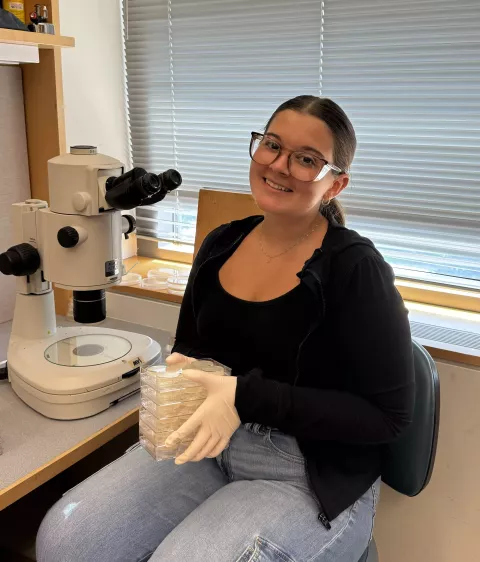
Riley Wilson is a genetics major from Colorado Springs, Colorado who was awarded a Summer Undergraduate Research Fellowship. She has spent her summer working in the Cote Lab, headed by Professor Rick Cote, conducting research that could lead to the development of a safer, more effective way to eliminate parasitic nematode worms and protect crops and agricultural workers.
Riley Wilson: I have been conducting research about blocking the expression of phosphodiesterase genes in microscopic nematode worms using RNA interference. My focus is on whether or not the blocking of these genes will prohibit these worms from surviving and reproducing.
Riley: The main goal of this research is to develop a safer, more effective nematicide to be used in commercial agriculture. Billions of crops are lost globally due to parasitic nematodes, and pesticides used currently can be harmful to agricultural workers. Developing a functional nematicide that is not harmful to humans would benefit both agricultural workers and the crops they grow.
Riley: As a result of this experience in undergraduate research, I am learning the importance of time management and multitasking. The research I am conducting must be done on a very strict schedule based on the lifecycle of the nematodes in the lab. Managing my time while I am physically in the lab is extremely important to make sure that my research continues to move forward. I also can run multiple experiments at a time if I multitask correctly, which makes my research more efficient and enables me to gather even more information for my project.
"Being at UNH has been the most incredible experience of my life. I traveled 2000 miles for college away from my home, but I am so grateful that I did."
Riley: I have been so graciously awarded a Summer Undergraduate Research Fellowship from the Hamel Center of Undergraduate Research for summer 2024. I also want to acknowledge my incredible mentor Dr. Rick Cote, my wonderful graduate student Kranti Galande, and the rest of the Cote lab team. The work conducted in the lab is also supported by the NH Agricultural Experiment Station Hatch Grants NH00679 and NH00722.
Riley: Being at UNH has been the most incredible experience of my life. I traveled 2000 miles for college away from my home, but I am so grateful that I did. Undergraduate research is one of the many things that make UNH so special. Being able to have questions and research those questions through the guidance of the university is an experience like no other, which is why UNH is the place to be.
Riley: The thing I love the most about UNH is how there are so many ways to be involved in the university. You can not only be involved with your major and the people within it, but you can be a part of so many different clubs, you can conduct research, and you can learn something new every single day here. The culture at UNH is focused on learning about the world and how you fit into it, which is such a special and rewarding experience.